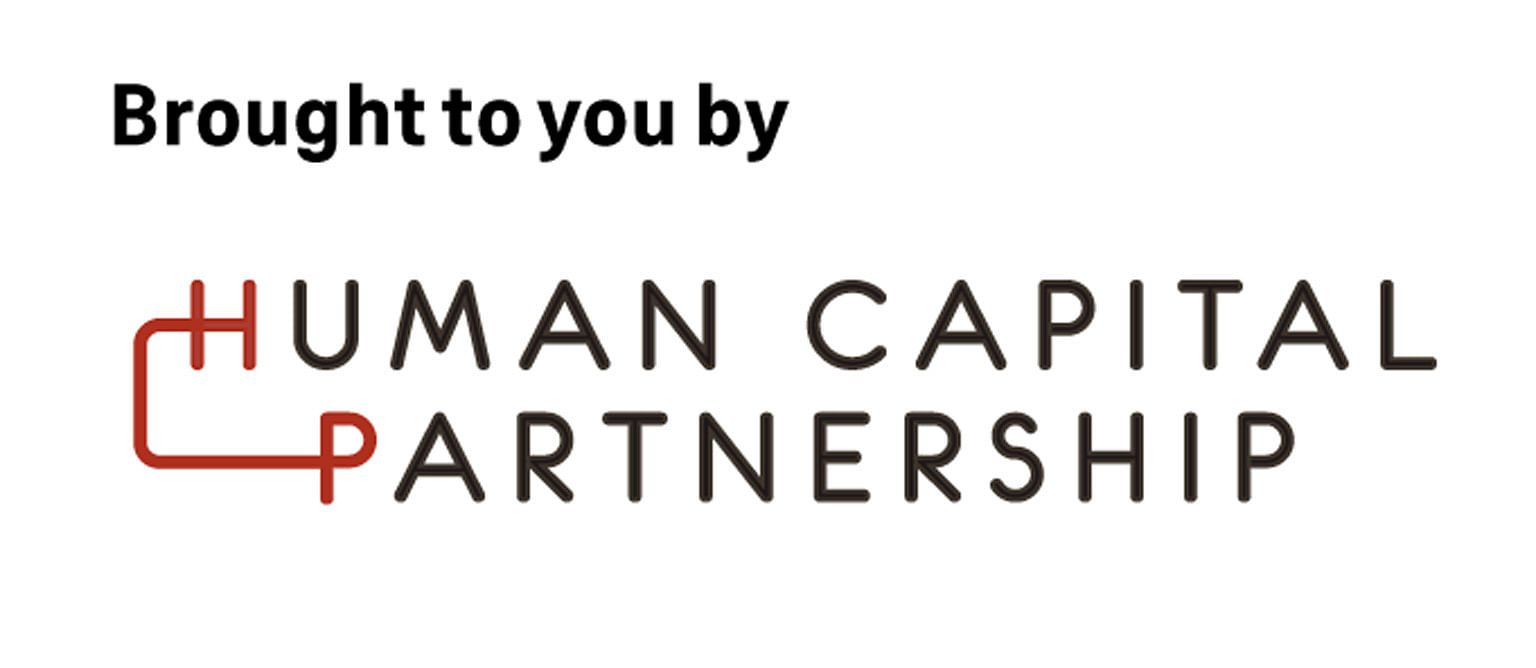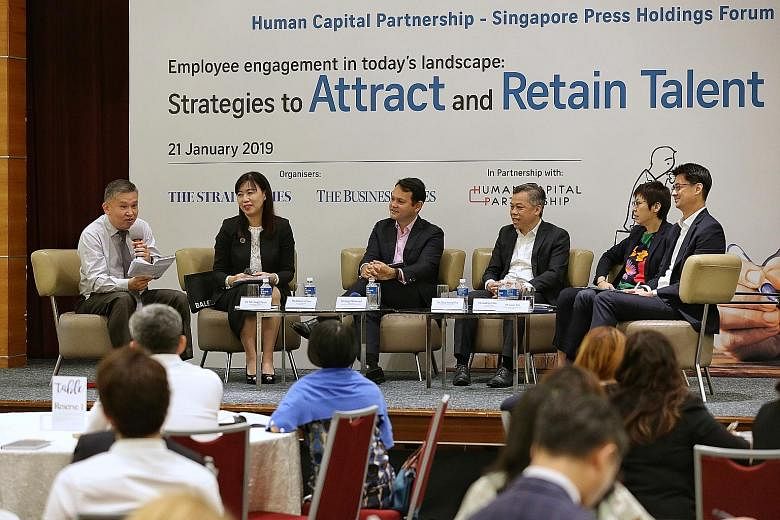Bosses should make the effort to engage employees to talk about their career plans, amid worries about how technology is disrupting businesses and changing jobs.
Having conversations with workers about where the company is heading and their role in the transformation builds trust, said Minister of State for Manpower and National Development Zaqy Mohamad.
He was among five speakers at the Human Capital Partnership-Singapore Press Holdings (HCP-SPH) Forum on employee engagement last week.
They talked about the importance of having an open work culture and a system to gather robust feedback from staff and act on it.
Besides Mr Zaqy, the other panellists were Ms Rebecca Chew, deputy managing partner at law firm Rajah & Tann; Mr Chia Yoong Hui, chairman and chief executive of maritime technology company Ascenz Solutions; Ms Audrey Cheong, managing director for Federal Express Singapore; and Mr Sean Tan, principal and consulting services leader at Mercer Singapore.
Leaders who care and build a company culture that resonates with workers can attract staff, said the panellists.

Also, while talent development is a key strategy in retaining workers, it is a two-way street. Employees will also need to take ownership of their own careers and growth.
-
Three objectives of programme
-
The HCP programme is a tripartite initiative comprising a community of employers who are committed to developing their human capital and progressive employment practices in their organisations.
The programme aims to achieve three major outcomes:
•Develop a stronger Singaporean core by investing in the development of local employees across all levels;
•Foster stronger complementarity between local and foreign employees;
•Facilitate skills transfer from foreign to local employees to enhance capabilities
For more information, contact the programme office, Tripartite Alliance for Fair and Progressive Employment Practices, at: Tel: 6302-2782 E-mail: hcpartner@tafep.sg Website: www.tafep.sg
Ascenz Solutions, Rajah & Tann and FedEx are part of the HCP programme, which was launched in 2017 to recognise progressive employers committed to developing staff.
The Straits Times also posed questions on the topic of employee engagement to human resources experts at four other Human Capital Partner firms in a virtual roundtable.
Here are some key takeaways from their responses.
THE 'X' FACTOR FOR SUCCESS
Employee engagement has been identified as the key ingredient in the recipe for success above the competition, said Mr Phan Yoke Fei, senior director for human resources and corporate administration at Gardens by the Bay.
This is especially important in today's context, where disruption is affecting businesses on a global scale and at unprecedented speed, he said. Some employees may find the challenges too daunting and look for alternative employers, in the hope of avoiding trouble in their careers.
"Very committed employees who are fully engaged with the organisation will try their very best to weather through the challenges with the same organisation," he said.
Ms Kang Mui Leng, head of human resources at equipment dealer Tractors Singapore, said that showing employees they are valued and empowered helps in developing and maintaining a long-term relationship with them.
"It is important as it affects the continuity of the business," she said.
Ms Jacqueline Gwee, director and founder of aAdvantage Consulting Group, added that engaged employees are also likely to recommend the organisation as a good place to work.
UNDERSTANDING WHAT EMPLOYEES WANT
So how best can companies engage employees? A common practice is to gather feedback through surveys or dialogues.
Ms Kang said monthly dialogues with Tractors' managing director are used to gather feedback, which is then discussed during management meetings.
She said this has been a successful tool for the firm and has likely contributed to halving the number of resignations last year, compared with 2017.
"Based on the feedback from new staff, some are surprised and most are happy to be able to sit down over breakfast and chat with the managing director casually. In addition, they get to know new colleagues from other departments," she said.
Tractors has 285 employees.
Engagement is also about understanding each employee's unique combination of strengths and weaknesses, as well as his desires, which may change over time.
"Employees go through different 'stages', and their needs and priorities evolve and change with time," said Ms Jacinta Low, head of human resources planning at OCBC Bank.
For example, the bank commissions task forces to implement suggestions that emerge from the annual employee engagement survey.
These have included work-life balance initiatives such as an in-house childcare centre and a Primary School Leaving Examination leave scheme, said Ms Low.
It can be a challenge for human resources teams to keep up with the issues raised through dialogues and continue to provide updates in a systematic manner, said Mr Phan.
But technology now makes it possible to have "live" platforms for feedback with almost verbatim record-keeping, which reduces confusion in interpreting responses. This makes it easier for the HR team to follow up, Mr Phan said.
Small firms may not need to conduct costly pulse surveys to gauge what employees want from their jobs, he added. The intimate connections and a family-like environment can also help the bosses get a good sense of things.
GOOD LEADERSHIP
People working in small firms tend to interact with management more, while those in larger organisations may have fewer regular encounters with business leaders.
Hence, communication is something leaders of larger organisations should pay special attention to, said Ms Gwee, especially as "inspiring leaders" was one of the top two priority areas affecting employee engagement, according to her firm's research.
For leaders to inspire, they need to communicate the rationale for changes, especially as many businesses are transforming, she said.
"People want to know the 'why', whereas in many organisations, we focus on the 'how' and 'what'. It is the 'why' that will inspire the change."
Leaders must provide direction, ensure the team is aligned in working towards the same goal and provide the required support, she said.
DEVELOPING TALENT AND RECOGNISING CONTRIBUTIONS
Workers naturally feel valued when an organisation recognises their contributions and successes.
A study by aAdvantage found that "employee recognition" was among the top key words chosen by employees from 2015 to last year, in terms of the workplace culture they wished to see, said Ms Gwee.
Her consultancy, which has about 30 employees, works with companies to identify the capabilities and attitudes staff and leaders need, so that they can provide suitable training, coaching and career development opportunities.
This can improve the company's ability to attract and retain staff, as they see the organisation as a place to learn and grow their careers.
Ms Low highlighted the OCBC Future Smart programme, which is a three-year training programme to reskill the bank's 29,000 global workforce in the face of digital disruption.
The bank is investing $20 million in it. The programme has four qualification levels and covers areas such as digital business models, technology and data, and customer-centricity.
A cheque-processing executive should be able to become a data scientist in three years through the courses, she added.
LEARNING FROM ONE ANOTHER
Companies can also stay on top of efforts to engage staff by sharing knowledge and best practices.
Ms Gwee said this is one of the benefits of being in the HCP programme. "(It) is a community of like-minded employers with common beliefs on how we want to create and sustain a positive employee experience for our people, which will lead us to organisational success," she said.
There are platforms such as forums, events and online bulletins through which employers can learn from one another, she said.
The HCP programme is managed by the Tripartite Alliance for Fair and Progressive Employment Practices. There are now 221 firms recognised as Human Capital Partners.
Mr Phan said being able to exchange ideas removes the need for costly experiments in new HR practices by individual companies, a boon for an organisation like his, which employs 360 staff.
EMPLOYEES HAVE A PART TO PLAY
While employers should put in the effort to understand and develop employees, workers can also help their companies create a work environment where they can thrive.
They can do this by giving their honest feedback through the channels provided by the company, said Ms Kang. They must also be willing to engage in changes that are necessary for improvement, both in their work and the work environment, she said.
Ms Low said OCBC tells employees about business challenges it needs to address, so that they can also take positive action to further the bank's interest.
"Employee engagement is about the relationship between the employee and the organisation, and, to succeed in today's business world, this two-way relationship needs to be a healthy one," she said.

